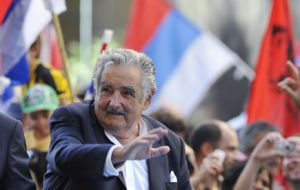MercoPress. South Atlantic News Agency
Top colours for Uruguayan president Mujica in his first 100 days
 Mujica, 74, preaches patience, negotiations and reconciliation, which seems the tune Uruguayans like to play
Mujica, 74, preaches patience, negotiations and reconciliation, which seems the tune Uruguayans like to play Uruguayan president Jose Pepe Mujica is riding high on public opinion approval in his first 100 days in office. According to the latest data from several pollsters, Mujica has an approval rating of 74%, which is 13 and 16 percentage points more than his two immediate predecessors Tabare Vazquez and Jorge Batlle.
The 74% is also considerably higher than the below 50% Mujica garnered in the first presidential electoral round in October 2009, which forced him into a run-off a month later.
The polls obviously show that Mujica’s performance enjoys a 90% positive approval from the coalition that he leads, Broad Front, but also support among the two main Uruguayan opposition parties, National and Colorado, has increased sustainedly and stands at an average of 60%, which is considered “remarkable”.
“This has much to do with the hand extended by Mujica to the opposition which has had a positive reaction in successful intra-party negotiations to have non ruling coalition members invited to the board of directors of some of the government’s control institutions and corporations”, according to political analyst Adolfo Garcé.
Besides, “members and militants of the National, Colorado and Independent parties are seeing in Mujica a president that far from hounding the opposition, or standing on the left to criticize the right, has chosen the middle ground and is constantly sending signals of unity and national reconciliation”, added Garcé.
This is particularly significant since Mujica as one of the urban guerrilla leaders of the sixties and seventies admitted, by appealing to force and violence, having pushed Uruguay into political turmoil and military dictatorship, which in his case cost him almost 14 years in jail, under harsh conditions.
This attitude has helped to soften the suspicion and adversity of old generation voters from the so called traditional parties, National and Colorado that remember those years of violence and social unrest.
Garcé said that the clearly political negotiation attitude of President Mujica, so far, and not only with the opposition but also towards the military and the Argentine government “is something which receives full support from the average Uruguayan voter”.
Mujica not only has sponsored dialogue with the opposition, whose leaders he consults regularly, but has also spoken in favour of ending the trials of human rights violations committed under the military dictatorship (three decades ago) which a radical wing of the ruling coalition is determined to continue.
Furthermore he has repeatedly suggested that all those military officers and civilians imprisoned for alleged crimes in those years, and over seventy years of age, should be allowed to comply with sentences under home arrest.
Regarding Argentina the main dispute is over the pulp mill built on this side of the river to which the Argentine government originally and later pickets strongly object. President Mujica made it an electoral promise to find a solution to the long standing four year dispute, through negotiations and “talking directly with the Kirchner couple as many times as needed”, which apparently he has managed.
But not soon enough to be included in the first one hundred days, so the next report on Mujica’s performance should be as good or even better.




Top Comments
Disclaimer & comment rulesCommenting for this story is now closed.
If you have a Facebook account, become a fan and comment on our Facebook Page!